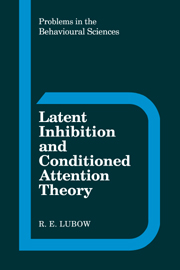Book contents
- Frontmatter
- Contents
- Preface
- 1 Introduction
- 2 Latent inhibition testing procedures
- 3 Variables affecting latent inhibition
- 4 Organismic variables affecting latent inhibition
- 5 Associative learning tests of the effects of stimulus preexposure in children and adults
- 6 Neural substrates of latent inhibition
- 7 Theories and explanations of latent inhibition in animals
- 8 Conditioned attention theory of latent inhibition
- 9 Conditioned attention theory as applied to latent inhibition in humans
- 10 Some applications of conditioned attention theory: learned helplessness and schizophrenia
- Notes
- References
- Author index
- Subject index
4 - Organismic variables affecting latent inhibition
Published online by Cambridge University Press: 13 October 2009
- Frontmatter
- Contents
- Preface
- 1 Introduction
- 2 Latent inhibition testing procedures
- 3 Variables affecting latent inhibition
- 4 Organismic variables affecting latent inhibition
- 5 Associative learning tests of the effects of stimulus preexposure in children and adults
- 6 Neural substrates of latent inhibition
- 7 Theories and explanations of latent inhibition in animals
- 8 Conditioned attention theory of latent inhibition
- 9 Conditioned attention theory as applied to latent inhibition in humans
- 10 Some applications of conditioned attention theory: learned helplessness and schizophrenia
- Notes
- References
- Author index
- Subject index
Summary
In general, the effects of organismic variables have not been subjects of investigation in regard to latent inhibition. The few exceptions include the variables of age, sex, and handling, with the former receiving the greatest attention by far. These areas are represented by a small number of experimental investigations, and some conclusions may be reached from the controlled comparisons. In addition, however, there is a body of information that is derivable from the fact that experiments on latent inhibition have been performed in a variety of species. It is therefore possible to examine, between experiments, effects that, with considerable caution, may be attributable to species differences. Prudence is dictated by the fact that across studies there is almost complete confounding of species and testing procedures.
Age
Only two studies have looked at the effect of age on latent inhibition within the conditioned suppression paradigm (Cone, 1974; Wilson & Riccio, 1973). This, of course, is not surprising, because the basic technique, whether tube licking or bar pressing, requires a relatively mature motor system. Other procedures, such as odor preference, are more amenable to dealing with the inherent problems of testing immature organisms.
In a sketchy report that is difficult to evaluate, Cone (1974) reported an age-related latent inhibition effect in a one-trial conditioned suppression test. With rats that ranged in age from 30 to 365 days, all groups showed latent inhibition to a light CS, except the 90–120 day-old group.
- Type
- Chapter
- Information
- Latent Inhibition and Conditioned Attention Theory , pp. 96 - 107Publisher: Cambridge University PressPrint publication year: 1989



